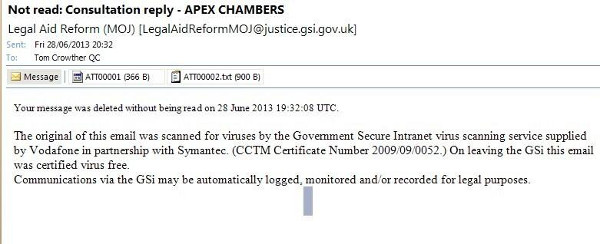 As part of Bristol Wireless, I’ve been closely involved in campaigning against the UK government’s plans for mass communications surveillance under the Communications Data Bill, also known as the “Snooper’s Charter” by its opponents (posts passim).
As part of Bristol Wireless, I’ve been closely involved in campaigning against the UK government’s plans for mass communications surveillance under the Communications Data Bill, also known as the “Snooper’s Charter” by its opponents (posts passim).
It now appears that all this work might have been in vain. Amongst the revelations that have come to light as a result of US whistleblower Edward Snowden‘s disclosures to The Guardian and The Washington Post was the news that for many years, GCHQ, the British state’s eavesdroppers, have been running a programme called Tempora, which has been hoovering up internet traffic and communications data from undersea cables before they make landfall in the UK.
GCHQ has been sucking up this data from millions – if not billions – of internet and telecommunications users at the rate of 600 mn. phone calls and 39 mn. gigabytes of data a day.
In spite of this damning evidence, Foreign Secretary William Hague has been trotting out the same old “if you’ve nothing to hide, nothing to fear” mantra. I have some advice for Mr Hague: try telling that to the family of Stephen Lawrence, who have just discovered 20 years after his killing that part of the British state called the Metropolitan Police tried to smear and discredit the family after they’d mishandled Stephen’s murder investigation.
However, there is a bit of positive news that has emerged today: Liberty – the human rights organisation – has today announced that it has issued a claim against the British intelligence services over their suspected involvement in the PRISM and Project Tempora privacy scandal.
Liberty believes that its electronic communications – and those of its staff – may have been unlawfully accessed by the likes of the Security Services and GCHQ.
Liberty will be ask the Investigatory Powers Tribunal (IPT) whether the British intelligence services have used PRISM and/or Tempora to bypass the formal UK legal process which regulates the accessing of personal material. The human rights group has issued a claim in the IPT, contending that rights under Article 8 of the Human Rights Act (the right to respect for a person’s private and family life, home and correspondence) have been breached.
Furthermore, Liberty is also concerned that the British Intelligence Services have used PRISM and Tempora to evade legal checks and balances and monitor people in the UK and may be treating internet communications as international rather than domestic to evade closer scrutiny and receiving material from their US partners to evade scrutiny altogether.
James Welch, Legal Director for Liberty, said: “Those demanding the Snooper’s Charter seem to have been indulging in out-of-control snooping even without it – exploiting legal loopholes and help from Uncle Sam.”
Finally, all this Anglo-Saxon surveillance has not gone down too well with some on the European mainland. Earlier this week, German Justice Minister Sabine Leutheusser-Schnarrenberger wrote the following in the international edition of Der Spiegel:
The more a society monitors, controls and observes its citizens, the less free it is. In a democratic constitutional state, security is not an end in itself, but serves to secure freedom.
Quite.
Contrast that civilised view with the control freakery displayed by UK Home Secretary Theresa May.
This is a revised version of a post originally written for Bristol Wireless.



 The Senate and the National Assembly, the two houses of the French parliament, have agreed to make free software a priority for education,
The Senate and the National Assembly, the two houses of the French parliament, have agreed to make free software a priority for education, 

 The City of Genoa in Italy is now encouraging the use of free and open source software and is saving local taxpayers more than €100,000 per year,
The City of Genoa in Italy is now encouraging the use of free and open source software and is saving local taxpayers more than €100,000 per year,  As part of Bristol Wireless, I’ve been closely involved in campaigning against the UK government’s plans for mass communications surveillance under the Communications Data Bill, also known as the “Snooper’s Charter” by its opponents (
As part of Bristol Wireless, I’ve been closely involved in campaigning against the UK government’s plans for mass communications surveillance under the Communications Data Bill, also known as the “Snooper’s Charter” by its opponents (